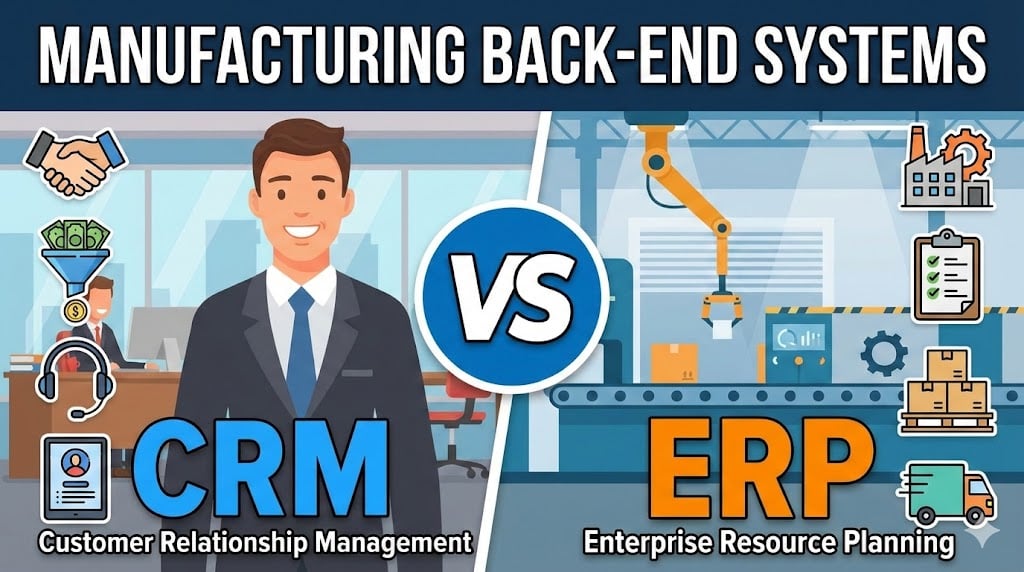
Content Marketing,Content Marketing | 11 min read
This month’s blog will be one of Ucidity’s most unique blogs, where excitement and financial expertise collide to bring you the most insightful and valuable content! We are thrilled to introduce a co-author, Sean McHugh of McHugh's Financial Services.
With Sean's passion for helping businesses thrive through positive cash flow, we hope you’ll find this blog insightful.
Growing up, Sean was surrounded by the diligent work ethic of his father, who was a skilled boiler maker. Witnessing the dedication and craftsmanship his father displayed, Sean developed an innate appreciation for hard work and its impact on success.
Amid the clanking of machinery and the hum of productivity, Sean witnessed firsthand the dedication and tireless efforts of his father, a true artisan in boiler making. As he observed the transformation of raw materials into exquisite products of exceptional quality, Sean's spirit ignited a burning passion for following in his father's footsteps and forging his own path in manufacturing, leading him to pioneer a financial service that aims to help businesses mainly in the manufacturing industry gain positive cashflow at all times.
However, his mother unknowingly set the stage for Sean's future endeavours. At a young age, Sean’s mum taught him how to touch type, a skill that would prove invaluable as he navigated the world of finance. Little did they know that this seemingly simple lesson would play a pivotal role in shaping Sean's career.
In his younger years, Sean wanted a customer service job that was transactional and easy to navigate. He worked at one of the world’s biggest computer manufacturers but later got poached by a rival; where he developed an order placement portal where the company could resell its products and create quotes for its customers.
He later joined Prospa, a business loan specialist, which exposed him to financing services. Soon enough, Sean felt that he was limiting himself and his capacity to help people, so he moved into brokerage, where there was much more flexibility in how he could help businesses.
Fuelled by his upbringing, armed with his flash-like touch typing skills and his passion for upholding his mission of assisting small-medium-sized businesses to make it out in the world, Sean embarked on a journey to help businesses thrive through positive cash flow. He became one of the manufacturing industry’s most prominent financial enablers.
With his extensive knowledge and experience in financial services, he has guided numerous enterprises towards sustainable growth and prosperity. Sean's passion is contagious, and his unwavering dedication to his clients sets him apart in the industry.

The Current Economic Slowdown - Is It Real?
Amidst the prevailing economic slowdown in Australia, Sean sometimes also finds himself navigating uncharted waters. The challenges posed by the current economic crisis have forced many business owners, including Sean, into survival mode, seeking ways to weather the storm and ensure the continuity of his unwavering commitment to supporting and uplifting others who share his passion for growth and excellence.
Recognising the importance of fostering economic resilience, Sean has taken it upon himself to extend a helping hand to small and medium-sized businesses in need. By leveraging financial assistance programs and exploring avenues for collaboration, he aims to empower fellow entrepreneurs who dream of expanding their operations and making a mark in the industry. In a time when businesses are cautious about spending and venturing into uncertain territories, Sean's dedication to the growth of others stands as a testament to his unwavering spirit and belief in the power of collective success.
According to sources, Australian businesses are just some experiencing the current economic downturn. And while many economists say that Australia has one of the stronger economies globally, many local economists seem to disagree,
The current economic climate in Australia has been marred by a noticeable slowdown, triggering a wave of caution among businesses across various industries. The initial blow came with the advent of the Covid-19 pandemic, which not only disrupted global supply chains but also led to significant reductions in consumer spending. As businesses grappled with lockdowns, restrictions, and reduced customer footfall, their revenue streams were severely impacted. Moreover, the subsequent challenges of inflation and rising interest rates have only added fuel to the fire, exacerbating the struggles Australian enterprises face.
Inflation, characterised by a sustained increase in the general price level of goods and services, has introduced a new layer of uncertainty into the business landscape. As raw materials, labour, and operational expenses continue to rise, businesses must reassess their pricing strategies and profit margins. This cautious approach stems from the fear of alienating price-sensitive customers or losing competitiveness in the market.
The volatility caused by fluctuating inflation rates has made it challenging for businesses to accurately forecast and plan for the future, leading to an overall reluctance to make large-scale investments or engage in ventures with inherent risks. Adding to the complexity, the recent increase in interest rates has further burdened businesses, as higher borrowing costs have limited their financial flexibility and put additional strain on their cash flow.
Consequently, this climate of economic uncertainty has left many Australian businesses grappling with difficult decisions and opting for conservative approaches to safeguard their sustainability in the face of ongoing challenges.
Fast forward to 2023, where Sean, who leads McHugh’s Financial Service, is now an established entity that aims to help SMEs by turning their vision into reality. With a discerning eye, he has observed rising inflation, increasing labour and material costs, and its adverse impact on businesses. Sean believes the current economic slowdown is merely the tip of the iceberg, with more challenges. The rising inflation rates have led to a significant surge in essential goods and services prices, creating a ripple effect across industries. As the cost of labour and raw materials continues to climb, businesses face mounting pressure on their profit margins, making it increasingly challenging to sustain growth and expansion.
Sean understands the importance of accurately assessing market conditions and trends, and his foresight leads him to believe that the economic situation in Australia could be more stable. While businesses are already struggling with the current slowdown, he anticipates further obstacles in the months and years.
With interest rates rising, borrowing costs are set to increase, placing additional strain on businesses' financial resources. This combination of factors paints a challenging picture for the future of entrepreneurship in Australia. Sean is acutely aware of the need for strategic planning, resilience, and adaptability to weather the storm ahead.
Navigating through adversity requires a proactive approach and a willingness to embrace change. With his unwavering commitment to quality and a keen understanding of the industry, Sean is determined to overcome the hurdles posed by the economic downturn. He remains focused on finding innovative solutions, exploring new markets, and forging strategic alliances to ensure his business's continued growth and success, even in the face of an uncertain economic landscape.
In the effort to make it through the economic downturn, business owners like Sean McHugh believe that bringing manufacturing onshore has become an increasingly discussed topic in recent times, and Sean firmly believes in its potential benefits. By shifting production closer to home, businesses gain better control over manufacturing, allowing for enhanced quality control and oversight. The proximity of manufacturing facilities to the local market facilitates faster response times, reduced lead times, and improved communication between manufacturers and customers.
One notable advantage of local manufacturing is the ability to ensure higher-quality products. With production facilities in close proximity, businesses can closely monitor each stage of the manufacturing process, from sourcing raw materials to the final assembly. This hands-on approach enables manufacturers to implement stringent quality control measures, producing products that meet or exceed customer expectations. By being physically present throughout the manufacturing process, businesses can promptly address any issues or defects, improving customer satisfaction and brand reputation.
Local manufacturing promotes job creation and supports the domestic economy. By bringing production onshore, businesses generate employment opportunities, contributing to reduced unemployment rates and increased economic growth. The wages earned by workers in the manufacturing sector are often spent within the local community, further stimulating the local economy. This ripple effect can result in a sustainable cycle of growth and development, fostering prosperity for both businesses and individuals.
Manufacturing locally offers greater flexibility and adaptability. In the face of changing market demands and evolving consumer preferences, local manufacturers can swiftly respond to emerging trends. They can tailor their products to cater to specific market segments, providing a competitive edge over offshore manufacturers that may need help with the same level of agility and customisation.

Who Has Been Hit The Most?
The economic downturn has cast a long shadow over various industries, and some of the hardest-hit sectors include construction, hospitality, restaurants, pubs, and physical retail stores. These industries have faced significant challenges as consumer spending patterns shifted, restrictions imposed, and economic uncertainty loomed.
The construction industry has felt the impact of the economic slowdown as demand for new projects and property development waned. With tighter budgets and reduced investments, construction companies have had to contend with decreased revenue streams and project delays. The decline in construction activity has affected businesses directly involved in the sector and has a ripple effect on suppliers, subcontractors, and other related industries.
Hospitality, including restaurants and pubs, has been severely impacted due to restrictions on social gatherings and travel limitations. The closure of dine-in services and the decline in tourism have led to a sharp decline in revenue for these establishments. Many businesses have had to pivot to delivery and takeaway services, but these alternative models have not fully offset the loss of revenue from in-person dining experiences. As a result, numerous hospitality businesses have struggled to stay afloat, with closures and layoffs becoming distressingly common.
Physical retail stores have also faced immense challenges with the rise of e-commerce and changing consumer behaviours. As people increasingly shop online, foot traffic in brick-and-mortar stores has dwindled. This shift in consumer preferences and reduced disposable incomes has left many retail businesses grappling with declining sales and mounting pressure to adapt their strategies. Store closures and downsizing have become necessary for survival in an increasingly digital landscape.
Unsure Whether to Continue Marketing? Keep These in Mind
With strategic planning and focusing on key areas, weathering the storm and even thriving in difficult times is possible. Here are three essential strategies to effectively market your business during an economic downturn.
Know Your Numbers
In times of economic uncertainty, monitoring your financials closely becomes crucial. Analyse your revenue streams, expenses, and profit margins to understand your business's financial health. Identify improvement and cost-cutting opportunities, you can optimise your resources and make informed decisions. Regularly track your key performance indicators (KPIs) to help you measure your marketing efforts' effectiveness and adapt your strategies accordingly.
Have a Plan
A well-defined marketing plan is essential to navigating an economic downturn. Start by assessing your target market and understanding their evolving needs and preferences. Develop a value proposition communicating your products or services' benefits in these challenging times. Leverage cost-effective marketing channels like social media, email marketing, and content creation to reach your target audience without straining your budget. Consider partnering with complementary businesses for joint marketing initiatives to expand your reach and maximise resources. Above all, adjust your marketing plan flexibly and agile as market conditions evolve.
Customer Retention
Retaining existing customers is crucial during an economic downturn. Focus on building solid relationships with your customer base by providing exceptional customer service and personalised experiences. Regularly communicate with your customers through targeted email campaigns, loyalty programs, and exclusive offers.
Offer value-added services or discounts to encourage repeat purchases and customer loyalty. By prioritising customer retention, you can benefit from repeat business, positive word-of-mouth referrals, and long-term customer relationships that can sustain your business even in challenging times.
Customer retention is more cost-efficient compared to acquiring new customers. Studies have consistently shown that acquiring a new customer can be anywhere from 5 to 25 times more expensive than retaining an existing one.
The Catalyst in This Downturn
Financial services providers emerges as crucial enablers for businesses, offering a lifeline that helps them navigate challenging times and achieve their goals. These institutions empower businesses by providing financial support and flexibility to thrive, even in adverse market conditions.
One of the critical ways financial services providers assist businesses during an economic slowdown is by facilitating access to capital. Whether through loans, lines of credit, or financing options, these institutions enable enterprises to secure the funds needed for various purposes. This capital infusion allows businesses to invest in critical areas such as purchasing equipment, expanding operations, or launching new products and services. By accessing additional funds, companies can seize opportunities, even in a slow market, and position themselves for growth once the economic conditions improve.
Financial services providers help businesses take calculated risks without putting on their regular cash flow. During an economic slowdown, businesses may need to innovate or diversify their offerings to adapt to changing market dynamics. This often requires investment in research and development, marketing campaigns, or new market entry strategies; by offering tailored financial solutions, such as venture capital, angel investments, or business loans with favourable repayment terms, financial services providers allow businesses to explore new avenues and undertake strategic initiatives while preserving their cash flow for day-to-day operations.
Additionally, financial services providers contribute to the stability and growth of the overall economy. These institutions help maintain employment levels, foster entrepreneurship, and drive innovation by supporting businesses' financial needs. The availability of financing options promotes economic resilience and allows businesses to weather the storm, ultimately contributing to a quicker recovery when the economic conditions improve.
On average, 10% of businesses excel during an economic downturn - are you poised to be one of those 10%?
Sink Or Swim?
Finding the right balance between maintaining marketing efforts and navigating through an economic downturn is crucial for businesses. While some may be tempted to cut back on marketing expenses during challenging times, it is critical to recognise the value of continued marketing efforts in driving sales, attracting new clients, and positioning the business for long-term success. Here are some critical considerations for businesses seeking to keep their marketing services active despite an economic downturn:
Targeted and Cost-Effective Strategies
Evaluate your marketing strategies and focus on those that offer the best return on investment. This could involve reallocating resources to digital marketing channels, such as social media, email campaigns, content creation, and search engine optimisation. These channels often provide a cost-effective way to reach and engage your target audience. You can optimise your marketing efforts and maximise your limited resources by targeting specific demographics and utilising data-driven insights.
Adaptation and Flexibility
In economic uncertainty, consumer behaviours and needs may evolve rapidly. Staying agile and adapting your marketing messages and strategies is essential. Consider offering special promotions, discounts, or value-added services to attract or retain new customers. Monitor market trends and consumer sentiment to identify emerging opportunities and adjust your marketing efforts to meet changing demands.
Customer-centric Approach
Place a strong emphasis on customer satisfaction and loyalty. Happy customers are more likely to continue supporting your business and recommend it to others, even during an economic downturn. Invest in exceptional customer service and personalised experiences to cultivate long-term relationships. Leverage customer testimonials, reviews, and case studies as part of your marketing collateral to showcase your business's value.
Strategic Partnerships and Collaborations
Explore opportunities for partnerships and collaborations with complementary businesses. By joining forces, you can pool resources, reach a wider audience, and amplify your marketing efforts. Consider co-marketing campaigns, joint events, or cross-promotions that can benefit both your business and your partner's business while also increasing brand visibility and customer reach.
Monitor and Measure Results
Keep a close eye on the performance of your marketing initiatives and measure their effectiveness. Track key performance indicators (KPIs) such as website traffic, conversion rates, customer acquisition costs, and lifetime value. This data will help you make informed decisions about allocating resources and fine-tune your marketing strategies for maximum impact.
Ultimately, maintaining marketing efforts during an economic downturn requires careful planning, adaptation, and a customer-centric approach. By strategically investing in targeted marketing initiatives, staying flexible, and continually assessing the results, businesses can strike the right balance between generating sales, staying afloat, and positioning themselves for future growth when economic conditions improve.
Reach out to Ucidity’s Team of Marketing experts and get more insight into how your marketing can still be in full swing despite the economic downturn.
Find out more about Sean McHugh and McHugh’s Financial Services by visiting their website and connecting with them on Linkedin!
Published on June 08, 2023



